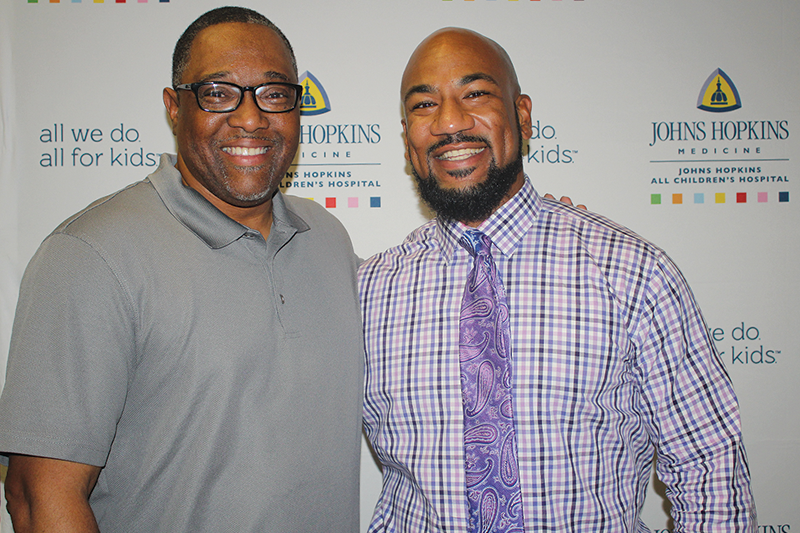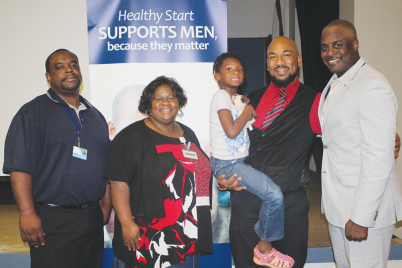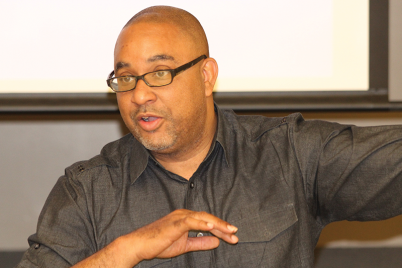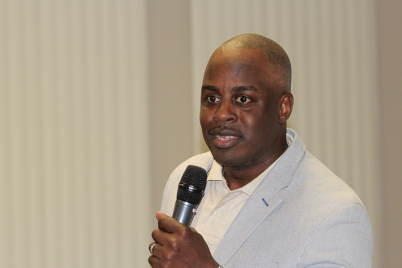Kenneth Braswell, left, and Dr. Christopher Warren
BY FRANK DROUZAS, Staff Writer
ST. PETERSBURG — Kenneth Braswell, the executive director of Fathers Incorporated, an agency founded in 2004 whose mission focuses on remediating the impact of father absence, headlined Thursday night’s workshop of the Black Men and Boys Week at Johns Hopkins All Children’s Hospital Education and Conference.
Dr. Christopher Warren, project coordinator of Figuring It Out for the Child (FIOC) in the Family Study Center at the University of South Florida-St. Petersburg (USFSP) and a myriad of local and nationally recognized speakers kick-started a discussion throughout the city addressing misconceptions and stigmas surrounding young black males.
Fathers Incorporated was birthed out of his own personal issues that he was going through at the time when he found himself in family court for the custody of his daughter. The judge challenged him and his daughter’s mother to figure things out for themselves outside the courtroom in a week’s time, and that’s exactly what they did.
“And what she did was that she put us in this space where the two of us had to figure out how to be good parents,” he said. “My daughter is now 17 years old. We never had to go back to court.”
He added that his story is what drives him to do this work. Fatherhood is not just about being a dad, Braswell said, fatherhood is as much about being a man as about being a dad. Hallmarks of manhood include being a benchmark in life, society and family. It is part of the masculine responsibility to demonstrate strength and stability, to protect and provide those within their sphere of influence. If a person has not developed himself as a man, how can he develop himself as a father, he asked.
Concerning the image of fatherhood as it relates to many black men, it is a negative image that is difficult to overcome, he noted.
“We fight the imagery within our own selves as men,” Braswell pointed out. “We fight the imagery with respect to what it looks like to our women. We fight the imagery with respect to what it looks like to the broader society.”
Braswell pointed out the deterioration of the father figure in the TV era from capable single widowers of the 1960s like Andy Griffith to strong mentor figures like Arthur “The Fonz” Fonzarelli and Bruce Wayne (whose secret identity was Batman) all the way to inept figures like Al Bundy and ultimately cartoonish figures like Homer Simpson.
“We went from this era of fathers being really strong and loving and present an available and smart and meaningful in the lives of their children to becoming buffoonish,” he observed. “An appendage to the family, not taken seriously.”
Many times, he said, people will say people emulate media, but Braswell believes it’s the opposite. Media only shapes itself around what it sees in society and then we respond to it, he noted.
Concerning what shapes our view of family, Braswell asked: How do you expect a girl to grow up and choose the right man when her only interaction has been with boys? What would our little boys become if we told them how beautiful they are in God’s eyes, as opposed to the counter narrative that we say about our boys and our girls?
Personal history shapes our thoughts about family, he said, along with other factors such as media and education also contribute to the ideal of what a family should be. As little boys pretending to be superheroes, Braswell observed, we all desired to save the world, while we watch our sister nurture the world by playing at motherhood with dolls.
“Somewhere along the line for little boys that changes,” Braswell said, “and we start to have less empathy for little boys. Somewhere along the line they change from our little boys to that trifling man.”
He touched upon the fear and reluctance of most men to be perceived as weak in any sense, from reluctance to taking care of themselves and making trips to the doctor all the way to something as ostensibly trivial as asking for directions. Getting men educated to get and stay healthy is key, he said, and this includes knowing what questions to ask concerning health issues and prescriptions.
“One of the reasons why we don’t talk about father absence is that there are so many emotions that swirl around it,” Braswell said.
For some odd reason when it comes to talking about fathers, he said, there are so many different emotions that pop up, whether it is from our own relationship with our father, the relationship with the fathers of our children, the relationship with the fathers of the people in our lives, the relationship with fathers in general—all of those relationships stir up some kind of emotion in people and unfortunately for the most part they tend to be negative.
“So because people don’t like pain,” he said, “because people don’t like conflict, rather than deal with it we do what? We ignore it. And the more and more that we ignore it, the worse and worse it’s going to get.”
Anyone can be a father, he said, but the key is to get them to be responsible fathers.
The week-long event was sponsored in part by the University of South Florida, St. Petersburg, Johns Hopkins All Children’s Healthy Start and other organizations
Related Stories – Previous: More Than a Statistic | Next: The Importance of Black Men Mentoring








